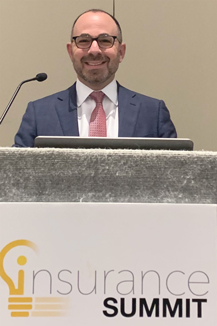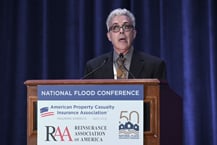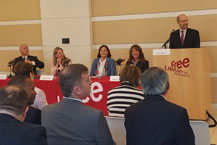Pennsylvania Insurance Department Adopts Revised Privacy Regulation
Pennsylvania Supreme Court to Decide ‘Catch All’ Standard Under Consumer Protection Law
Pennsylvania Legislation for State-Based Health Exchange Receives Bipartisan Support
People News
Pennsylvania Insurance Department Adopts Revised Privacy Regulation
By Steven B. Davis and Kristin J. Jones
On June 20, the Pennsylvania Insurance Department (PID) adopted a new regulation governing the privacy of consumer financial information held by insurers and other licensees.
The regulation eliminates the requirement for PID licensees to issue an annual privacy notice. This change brings Pennsylvania in line with similar federal regulation. Federal law governing privacy notices was established by the Gramm-Leach-Bliley Act (GLBA). The GLBA requires financial institutions to provide an initial notice of privacy practices and procedures, an opt-out notice, and a reasonable opportunity to opt out at the outset of the relationship when the individual becomes a consumer. When a financial institution establishes a “customer relationship with a consumer,” it becomes subject to an annual notice requirement as well.
The National Association of Insurance Commissioners (NAIC) published Model Regulation No. 672 to help set standards for notice and opt-out requirements at the state level like those at the federal level. Pennsylvania, like many other states, adopted regulations based on Model Regulation 672 in 2001.
In 2015, however, the GLBA’s annual notice requirement was amended by the Fixing America’s Surface Transportation Act. The amendment added an exception to the GLBA’s annual notice requirement. Specifically, the FAST Act eliminates the annual notice requirement if the financial institution:
- only shares nonpublic personal information as permitted by the GLBA’s exceptions to providing opt-out rights to consumers; and
- has not changed its privacy practices as described in the most recently distributed privacy notice.
The GLBA, including the FAST Act amendment, does not supersede, alter or affect state laws. Only state laws that are inconsistent with the GLBA are preempted, and then only to the extent of the inconsistency. State laws providing greater protections than the GLBA are not considered inconsistent. Consequently, insurers in Pennsylvania and other states adopting Model Regulation 672 were still required to distribute an annual privacy notice.
In response to the changes at the federal level, the NAIC revised Model Regulation 672. The regulatory amendments the PID adopted on June 20, bring Pennsylvania in line with the revised version of Model Regulation 672.
In addition to eliminating the annual notice requirement, the revisions add a cross-reference to the federal model privacy form.
Pennsylvania Supreme Court to Decide ‘Catch All’ Standard Under Consumer Protection Law
By Karl S. Myers
On June 27, the Supreme Court of Pennsylvania announced it would hear Gregg v. Ameriprise Financial, a dispute over the culpability standard for the “catch all” provision of the Unfair Trade Practices and Consumer Protection Law. That statute allows consumers who purchase goods or services to sue vendors who engage in “fraudulent or deceptive conduct” that “creates a likelihood of confusion or of misunderstanding” during a transaction.
To this point, Pennsylvania’s intermediate appellate courts (the Superior and Commonwealth courts) have applied a strict liability standard to “catch all” claims. As the Superior Court panel described in Gregg, those courts do not require consumers to prove common law fraud for their “catch all” claims, given the legislature intended a consumer-friendly standard when it passed an amendment to the statute in 1996. Instead, the Gregg court explained, any deceptive conduct creates a cause of action. It does not matter if the conduct was intentional or negligent, or even if the vendor used the utmost care.
Ameriprise evidently disagrees with this assessment of the “catch all” provision, so it sought discretionary review from the state’s Supreme Court. Ameriprise pointed out that the statute requires proof of “fraudulent or deceptive conduct,” which appears inconsistent with a strict liability standard. And now the Supreme Court has agreed to take the case.
Claims under the Consumer Protection Law are common in insurance and other lawsuits brought by consumers, so this case could disrupt the litigation landscape. If the Supreme Court parts ways with the Superior and Commonwealth courts and holds proof of fraud is required, the number of “catch all” claims could plunge. On the other hand, if the Supreme Court endorses or strengthens the approach of those courts, it could embolden consumers to file more lawsuits with “catch all” claims in the future.
The briefing in Gregg is about to get underway and should occupy the remainder of the summer and much of the fall. Oral argument should take place in April 2020 in Pittsburgh, with a decision likely to follow in late 2020.
Pennsylvania Legislation for State-Based Health Exchange Receives Bipartisan Support
By Steven B. Davis and Kristin J. Jones
New legislation passed by the General Assembly and supported by Republican and Democratic lawmakers in Pennsylvania creates authority for the commonwealth to operate a state-based health exchange for Affordable Care Act individual market plans. Currently, the federal government runs the exchange in Pennsylvania, and the legislation would bring Pennsylvania in line with around a dozen other states that operate their own health exchanges.
Nearly 400,000 Pennsylvanians purchase health insurance on the individual market. The exchange is a marketplace for individuals seeking to purchase health insurance, and it matches individuals with federal subsidies in order to reduce the costs associated with purchasing health insurance.
The bill followed accusations that the federal health exchange is costing Pennsylvanians too much money. Specifically, the federal government charges an $88 million annual fee to operate the exchange. Early estimates suggest that Pennsylvania could reduce those costs by approximately $50 million, reducing premiums for those who purchase insurance through the new exchange.
With support from Pennsylvania Gov. Tom Wolf, the bill moved rapidly through Pennsylvania’s legislative process. The bill was introduced and referred to the House Insurance Committee on June 4, 2019. After only a week, the Pennsylvania House of Representatives passed the bill with a vote of 198 to 1. The Senate unanimously passed the bill on June 27, with the House concurring with the Senate amendments only hours later. The governor signed the bill into law on July 2, less than a month after it was introduced.
In addition to creating a new state-based exchange, the bill would establish a reinsurance program to pay high-cost health care claims. The federal government would contribute to the reinsurance program through a federal subsidy program.
People News
Steve Davis Serves as Course Planner for Saint Joseph's University Insurance Regulatory Summit

From left: Mike Consedine, CEO, NAIC; Jessica Altman, Pennsylvania Insurance Commissioner; Christie Corado, Deputy General Counsel, BB&T Insurance; Alison Beam, Chief of Staff, Pennsylvania Insurance Department; and Steve Davis, Insurance Practice Chair, Stradley Ronon.
Stradley Ronon Insurance Practice Chair Steve Davis served as a course planner for the SJU Insurance Regulatory Summit in Philadelphia. The featured speakers included NAIC CEO, Mike Consedine and Pennsylvania Insurance Commissioner, Jessica Altman. The program focused on the state of the insurance market, challenges for regulators, impacts on producers and policyholders, and cyber security issues.
Jeff Grossman Speaks at Two Events
 Stradley Ronon Partner Jeff Grossman served as a speaker at the NAIC Insurance Summit in Kansas City. Jeff’s panel, “Assessing Cybersecurity Insurance: What Questions to Ask,” covered a case study of recent and well-publicized cybersecurity breach, an explanation of cyber incident response and related litigation risks, and an explanation of the insurance underwriting factors and unique cyber policy attributes.
Stradley Ronon Partner Jeff Grossman served as a speaker at the NAIC Insurance Summit in Kansas City. Jeff’s panel, “Assessing Cybersecurity Insurance: What Questions to Ask,” covered a case study of recent and well-publicized cybersecurity breach, an explanation of cyber incident response and related litigation risks, and an explanation of the insurance underwriting factors and unique cyber policy attributes.
He also served as a panelist at the 10th Annual Advanced Forum on Managed Care Disputes and Litigation in Chicago. Jeff’s panel, “A Practical Guide for Assessing and Responding to Potential Data Breach,” assessed whether and when a company has to disclose that there is inadvertent release of protected health information, and the steps in-house counsel at a managed care organization should follow to ensure an adequate response to the data breach.
Craig Blackman Moderates at National Flood Conference
 Stradley Ronon Partner Craig Blackman served as the moderator for a panel at the National Flood Conference in Washington, D.C. Craig’s panel, “NFIP Legal Issues,” discussed recent trends in National Flood Insurance Program (NFIP) litigation, including the status of the litigation from Hurricanes Harvey and Irma and the 2016 Louisiana flooding.
Stradley Ronon Partner Craig Blackman served as the moderator for a panel at the National Flood Conference in Washington, D.C. Craig’s panel, “NFIP Legal Issues,” discussed recent trends in National Flood Insurance Program (NFIP) litigation, including the status of the litigation from Hurricanes Harvey and Irma and the 2016 Louisiana flooding.
Steve Johnson Speaks at Two Events & Appointed Chairman of Temple University’s Department of Risk, Insurance and Healthcare Management Industry Advisory Council
Stradley Ronon Insurance Financial and Regulatory Specialist Steve Johnson spoke at the Runoff Deal Market Forum in New York. Steve’s panel, “The Runoff Market: New Exit Tools in the US Market and the Regulatory Landscape,” discussed how state laws related to allowing division or insurance business transfers in their states can open up the potential for more deals in the runoff space.
He also spoke on two panels at the Pennsylvania Association of Mutual Insurance Companies Executive & Board Roundtable in Bedford Springs, Pennsylvania. His first panel, “Corporate Governance Framework & Board Policies and Procedures,” discussed company oversight and board structure, including duties of the board and its committees. His second panel, “Practices for Directing Senior Management & Critical Risks Areas Impacting Business Activities,” covered business code of conduct and ethics, evaluation of executive performance and compensation, and succession planning.
Steve was appointed to a two-year term as chairman of Temple University’s Department of Risk, Insurance and Healthcare Management Industry Advisory Council at the Spring IAC Meeting in Philadelphia. The Council supports the mission of RIHM, which is to be a leader in educating risk/insurance and actuarial science professionals of the future through innovative and rigorous coursework, experiential learning, placement support and lifelong learning, as well as in producing top-level research worldwide.
Kristin Jones Participates in ALIC Meetings
Stradley Ronon Health Law Practice Chair Kristin Jones presented at the 2019 ALIC Annual Meeting in West Palm Beach, Florida. Kristin’s panel, “Insurance Section: Data Privacy and Security Issues Update,” discussed recent developments in data privacy and cybersecurity regulations and their impact on insurance companies.
Kristin will also be presenting at ACLI’s Compliance & Legal Sections Annual Meeting in Fort Lauderdale on July 16. She will be speaking about federal preemption of state data privacy laws.
Karl Myers Moderates Superior Court Candidates Forum
 Stradley Ronon Appellate Practice Chair Karl Myers served as a moderator for the Pennsylvanians for Modern Courts’ and Philadelphia Bar Association’s interactive forum with the candidates for Pennsylvania's Superior Court in Philadelphia. The candidates answered Karl’s and audience members’ questions about the candidates’ experience and why they are seeking election to the Superior Court.
Stradley Ronon Appellate Practice Chair Karl Myers served as a moderator for the Pennsylvanians for Modern Courts’ and Philadelphia Bar Association’s interactive forum with the candidates for Pennsylvania's Superior Court in Philadelphia. The candidates answered Karl’s and audience members’ questions about the candidates’ experience and why they are seeking election to the Superior Court.
Information contained in this publication should not be construed as legal advice or opinion or as a substitute for the advice of counsel. The articles by these authors may have first appeared in other publications. The content provided is for educational and informational purposes for the use of clients and others who may be interested in the subject matter. We recommend that readers seek specific advice from counsel about particular matters of interest.
Copyright © 2019 Stradley Ronon Stevens & Young, LLP. All rights reserved.